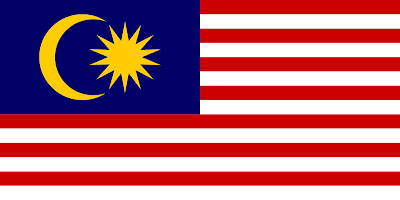Member Since 1973
|
Partner Ministry/Organization
Department of Polytechnic and Community College Education (DPCCE)
Ministry of Higher Education (MoHE)
Address of Embassy in Manila
107 Tordesillas Street Salcedo Village, Makati City, Philippines
Participation in Regional Programs (2018-2024)
Recent Programs Held (2018-2024)
2024:
2023:
2022:
2021:
2019:
2018:
|

Official Name
Malaysia
Land Area
330,803 km²
Country Borders
Thailand (north)
Singapore, Indonesia (south)
Brunei (east)
Singapore, Indonesia (south)
Brunei (east)
Capital
Kuala Lumpur
Religion
Islam (major religion)
Buddhism
Christianity
Hinduism
Buddhism
Christianity
Hinduism
Language
Bahasa Malaysia (Malay)
Demonym
Malaysian
National Holiday
31 August 1957 (Independence Day from Britain, Formation of the Federation of Malaya)

No. of Years - Primary Education
6 years
No. of Years - Lower Secondary Education
3 years
No. of Years - Upper Secondary Education
4 years
No. of Years - Tertiary Education
4 to 6 years
Ministries of Supervising Education
Ministry of Education
Ministry of Higher Education
Ministry of Higher Education

Agencies Handling TVET
Ministry of Higher Education
Ministry of Education
Ministry of Human Resources
Department of Polytechnic and Community College Education
Ministry of Education
Ministry of Human Resources
Department of Polytechnic and Community College Education
Formal TVET System
According to the Education Act of 1996, education from the primary level through to the post secondary level is provided for Malaysians. This includes the aim to strengthen TVET within training schools and institutions. Programs and trainings are being offered in the following levels:
- Basic Vocational Education (ISCED 2)
- Technical and vocational programmes (ISCED 3)
- TVET education at certificate and diploma levels (ISCED 4)
- TVET education (ISCED 5-8)
Qualification Framework
Under the approval of Malaysian Qualifications Agency Act in 2007, the Malaysian Qualifications Framework set the qualification standards for higher education and training sectors which represents the acquired knowledge, skills, values and their competencies at the end of a named programme.
Level of MQF
| LEVEL | DEFINITION |
|---|---|
| Malaysian Skills Advanced Diploma (DLKM) Level 5 – Management Level |
Competent in applying a significant range of fundamental principles and complex techniques across a wide and often unpredictable variety of contexts. Very substantial personal autonomy and often significant responsibility for the work of others and for the allocation of substantial resources feature strongly, as do personal accountabilities for analysis and diagnosis, design, planning, execution and evaluation. Specialization of technical skills should be demonstrated. |
| Malaysian Skills Diploma (DKM) Level 4 – Supervisory Level |
Competent in performing a broad range of complex technical or professional work activities performed in a wide variety of contexts and with a substantial degree of personal responsibility and autonomy. Responsibility for the work of others and allocation of resources is often present. Higher level of technical skills should be demonstrated. |
| Malaysian Skills Certificate (SKM) Level 3 – Supervisory Level |
Competent in performing a broad range of varied work activities, performed in a variety of contexts, most of which are complex and non-routine. There is considerable responsibility and autonomy and control or guidance of others is often required |
| Malaysian Skills Certificate (SKM) Level 2 – Operation and Production Level |
Competent in performing a significant range of varied work activities, performed in a variety of contexts. Some of the activities are non-routine and require individual responsibility and autonomy. |
| Malaysian Skills Certificate(SKM) Level 1 – Operation and Production Level |
Competent in performing a range of varied work activities, most of which are routine and predictable. |
TVET Financing
The government funds the TVET in Malaysia through the Ministry of Education and the Ministry of Human Resources. This fund operates as a levy/grant system that imposes employers an amount and provides training grants in return. TVET students also have to pay for enrolment and participation fees.

Photo courtesy of Wigmore Trading
GDP
4.3% (2024)
Source: International Monetary Fund
Source: International Monetary Fund
Currency
Malaysian Ringgit (MYR)
Major Exports
Integrated Circuits ($71B)
Refined Petroleum ($29.3B)
Palm Oil ($15B)
Rubber Apparel ($13.3B)
Petroleum Gas ($10.7B)
Refined Petroleum ($29.3B)
Palm Oil ($15B)
Rubber Apparel ($13.3B)
Petroleum Gas ($10.7B)
Major Imports
Integrated Circuits ($34.4B)
Refined Petroleum ($18.7B)
Crude Petroleum ($4.92B)
Coal Briquettes ($4.36B)
Gold ($4.01B)
Refined Petroleum ($18.7B)
Crude Petroleum ($4.92B)
Coal Briquettes ($4.36B)
Gold ($4.01B)
Major Export Partners
Singapore ($49.6B)
China ($47.9B)
United States ($42.9B)
Hong Kong ($19.2B)
Japan ($19B)
China ($47.9B)
United States ($42.9B)
Hong Kong ($19.2B)
Japan ($19B)
Major Import Partners
China ($70.7B)
Singapore ($27.7B)
Japan ($15B)
United States ($14.8B)
Chinese Taipei ($13.8B)
Singapore ($27.7B)
Japan ($15B)
United States ($14.8B)
Chinese Taipei ($13.8B)

Photo courtesy of Sky News
Type of Government
Federal Parliamentary Elective Constitutional Monarchy
Head of State
Sultan Ibrahim Iskandar
President
President
Head of Government
Anwar Ibrahim
Prime Minister
Prime Minister
Branches of Government
The Legislature (the President and Parliament)
The Executive (Cabinet Ministers and office-holders, led by the Prime Minister)
The Judiciary
The Executive (Cabinet Ministers and office-holders, led by the Prime Minister)
The Judiciary

Photo courtesy of Old Penang Hotel
Literacy Rate
94.64% (2023)
Country Code
+60
ISO Code
MYS
Internet TLD
.my
Other Important Holidays
Chinese New Year
Hari Raya Aidilfitri Holiday (April 11)
Labour Day (May 1)
Wesak Day (May 22)
Hari Raya Haji (June 17)
Merdeka Day (August 31)
Malaysia Day (September 16)
Diwali (October 31)
Christmas (December 25)
Hari Raya Aidilfitri Holiday (April 11)
Labour Day (May 1)
Wesak Day (May 22)
Hari Raya Haji (June 17)
Merdeka Day (August 31)
Malaysia Day (September 16)
Diwali (October 31)
Christmas (December 25)
References
- https://www.un.org/en/chronicle/article/national-identity-and-minority-languages
- https://www.scholaro.com/db/Countries/Malaysia/Education-System
- https://oec.world/en/profile/country/mys
- https://librarylearningspace.com/malaysian-reading-habits-encouraging-but-more-must-be-done/
- https://publicholidays.com.my/2024-dates/
- https://unevoc.unesco.org/wtdb/worldtvetdatabase_mys_en.pdf










